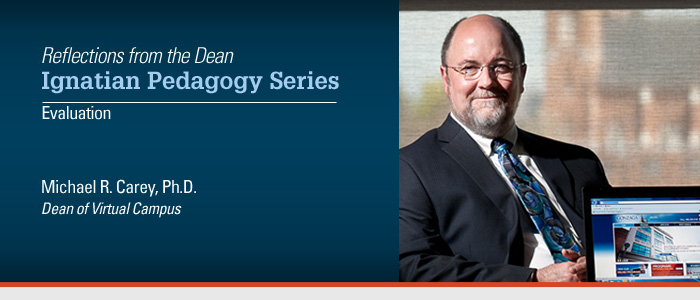The final discussion of Ignatian Pedagogy continues with a focus on the last dynamic of the process, Evaluation. My presentation is based on a document entitled “Ignatian Pedagogy: A Practical Approach,” which was written by the International Commission on the Apostolate of Jesuit Education in 1993.
As I mentioned previously, the Ignatian pedagogical process begins with Context, so that we know as much as we can about the reality within which the learning takes place. From there, the learning itself always proceeds with Experience, whether that happens directly or vicariously, in real-time or through memory. Next comes Reflection, in which the learner takes the perceived data and affective responses and organizes them to capture the meaning and essential value of the subject. This meaning is then translated into Action, in which the learner chooses the best possible course of action to flow from and follow up on what he or she has learned.
I mentioned previously that although there is freedom in the choices the learner makes, there is also a drive in Ignatian Pedagogy toward what is called the magis—the “more”—which means those actions that are in better service of God and people. In addition to the typical academic evaluation required to assess learning outcomes, periodic evaluation of the learner’s growth in attitudes, priorities and actions consistent with being—using the words of former Superior General of the Society of Jesus, Fr. Pedro Arrupe—a person for others is essential. There are many ways in which this fuller human growth can be assessed, taking into account the age, talents and developmental level of each learner: e.g., mentoring, review of journals, self-evaluation in light of personal growth profiles, as well as review of leisure-time activities and voluntary service to others.
We now have the complete process of Ignatian Pedagogy: Context, Experience, Reflection, Action, and Evaluation. This is an on-going process, in which Evaluation leads to a new Context, which leads to further Experience, Reflection, and Action, and then Evaluation again. This on-going process of Ignatian Pedagogy, when it moves from doing to being, makes the learner a critical thinker who can continually see possibilities where others only see barriers.
Gonzaga University states that “it educates the people the world needs most” and Ignatian Pedagogy is why that is true.
Dr. Michael Carey
